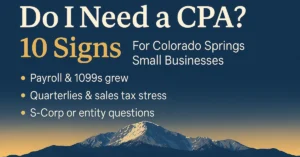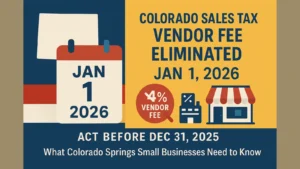Business Tax Structure Comparison: LLC vs S-Corp vs C-Corp Tax Strategies for 2025
Colorado Springs business owners face a critical decision that directly impacts their bottom line: choosing the optimal tax structure for their business. With the 2025 tax year now underway and enhanced IRS enforcement capabilities, understanding the tax implications of different business structures has never been more crucial. The right choice can save thousands in taxes annually, while the wrong structure may result in unnecessary tax burdens that limit growth potential.
2025 Tax Planning Opportunity
Understanding the Tax Impact of Business Structure Choices
Your business entity selection fundamentally determines how your business income gets taxed, what forms you'll file, and your personal liability exposure. Each structure offers distinct advantages and challenges that must align with your business goals and financial situation.
The Critical Distinction: Pass-Through vs. Corporate Taxation
Pass-through entities (including LLCs and S-Corporations) avoid the double taxation trap by passing business income directly to owners' personal tax returns. This means business profits are taxed once at individual rates. In contrast, C-Corporations face taxation at both the corporate level (21% federal rate) and again when distributions reach shareholders as dividends.
LLC Taxation: Understanding the Default Structure
How LLC Income Gets Taxed
Limited Liability Companies offer flexibility but come with a significant tax consideration many owners overlook. The IRS automatically classifies LLCs based on ownership structure:
- Single-member LLCs: Treated as disregarded entities for tax purposes (essentially sole proprietorships)
- Multi-member LLCs: Default classification as partnerships
The Self-Employment Tax Burden
The Hidden Cost Many LLC Owners Discover Too Late
Consider this scenario: Your LLC generates $150,000 in net profit for 2025. As an LLC member, you'll owe self-employment taxes on the entire amount—that's $19,837 in SE tax alone, regardless of how much cash you actually withdraw from the business. This tax applies whether you take distributions or leave profits in the company for growth.
S-Corporation: Strategic Tax Savings Through Salary Planning
The S-Corp Tax Advantage Explained
S-Corporations maintain pass-through taxation while offering a crucial tax-saving opportunity: the ability to split income between W-2 wages and distributions. This distinction creates substantial tax savings for profitable businesses.
- W-2 Salary: Subject to employment taxes (15.3% split equally between employer and employee)
- Distributions: Pass through to owners free from self-employment tax
Real-World S-Corp Tax Savings Calculation
2025 Tax Comparison Example
Meeting IRS Reasonable Compensation Requirements
Critical Compliance Requirement
The IRS considers multiple factors when evaluating reasonable compensation:
- Training, experience, and duties performed
- Time devoted to the business
- Compensation paid to non-shareholder employees
- What comparable businesses pay for similar services
- Compensation agreements and corporate minutes
C-Corporation: When Double Taxation Can Make Sense
Understanding C-Corp Tax Structure
C-Corporations pay a flat 21% federal income tax rate on all profits—significantly reduced from the pre-2018 rate of 35%. However, the double taxation issue remains:
- Corporate level: 21% federal tax on corporate profits
- Shareholder level: 0%-20% tax on qualified dividends (based on income)
Strategic Advantages of C-Corp Status
Despite double taxation, C-Corporations offer unique benefits for certain businesses:
- Unlimited number of shareholders and multiple stock classes
- Easier to raise venture capital or go public
- Ability to retain earnings at lower 21% rate for expansion
- More extensive fringe benefit deductions
- No restrictions on shareholder types (can include corporations and foreign investors)
Making the S-Corp Election for 2025
Critical Filing Deadlines and Requirements
2025 S-Corp Election Deadline
For existing businesses operating on a calendar year, Form 2553 must be filed by March 15, 2025, to elect S-Corp status for the entire 2025 tax year.
Late S-Corp Election Relief Options
Missed the March 15 deadline? IRS Revenue Procedure 2013-30 provides streamlined relief for late elections without requiring expensive private letter rulings. To qualify:
- File Form 2553 with "FILED PURSUANT TO REV. PROC. 2013-30" written at the top
- Submit within 3 years and 75 days of the intended effective date
- Include a reasonable cause statement explaining the delay
- Demonstrate the entity has operated as an S-Corp since the intended date
- Ensure all shareholders have reported income consistent with S-Corp treatment
Colorado-Specific Tax Considerations
State Tax Treatment and Filing Requirements
Colorado S-Corp Requirements
Colorado's tax treatment of business entities:
- S-Corps and LLCs: No entity-level state tax; income passes through to owners
- Individual tax rate: 4.4% on pass-through business income for 2025
- C-Corps: Subject to Colorado corporate income tax of 4.4%
- Shareholders must add back any state income tax deduction claimed by the S-Corp
When to Convert from LLC to S-Corp
S-Corp Conversion Thresholds
$60,000+ Annual Profit
Minimum ConsiderationAt this profit level, S-Corp tax savings typically begin to offset additional administrative costs and complexity.
$100,000+ Annual Profit
Clear AdvantageS-Corp election generally provides substantial tax savings that significantly exceed compliance costs.
$150,000+ Annual Profit
Significant SavingsBusinesses at this level often save $8,000-$15,000 annually through strategic salary and distribution planning.
$200,000+ Annual Profit
Maximum BenefitHigh-profit businesses see the greatest advantages from S-Corp structure and advanced tax strategies.
Critical S-Corp Compliance Requirements
S-Corp Annual Compliance Checklist
- Pay reasonable W-2 wages to all shareholder-employees (document basis)
- Run payroll at least monthly (quarterly at minimum)
- File quarterly payroll tax returns (Form 941) by deadlines
- Submit annual payroll reports (W-2s, W-3, Form 940)
- File Form 1120S by March 15 each year
- Issue K-1s to all shareholders by March 15
- Maintain corporate formalities (annual meetings, minutes, resolutions)
- Keep personal and business finances completely separate
- Track shareholder basis accurately throughout the year
- Deposit payroll taxes timely to avoid penalties
Comprehensive Tax Structure Comparison
| Comparison Factor | LLC | S-Corporation | C-Corporation |
|---|---|---|---|
| Self-Employment Tax | 15.3% on all net profit | Only on W-2 wages | Not applicable |
| Double Taxation | No | No | Yes (21% + dividends) |
| Federal Tax Rate | Individual rates (up to 37%) | Individual rates (up to 37%) | 21% flat corporate rate |
| Administrative Complexity | Low | Moderate (payroll required) | High |
| Annual Compliance Cost | $500-$1,500 | $2,000-$4,000 | $3,000-$6,000+ |
| Formation Flexibility | Very flexible | Restricted (100 shareholders max) | Most flexible |
| Ideal Profit Range | Under $60,000 | $60,000 - $1 million | Large/public companies |
| Ownership Restrictions | None | US citizens/residents only | None |
Common Questions About Business Tax Structures
Can I switch from LLC to S-Corp mid-year?
Yes, but mid-year conversions complicate tax filings significantly. You'll need to file both LLC returns (Form 1065 or Schedule C) for the pre-election period and Form 1120S for the S-Corp period. Most tax professionals recommend making elections effective January 1 to simplify compliance and maximize savings.
What constitutes "reasonable compensation" for S-Corp owners?
The IRS doesn't provide specific formulas, but courts have established guidelines. Many tax professionals use the 60/40 rule as a starting point (60% salary, 40% distributions), but this must be adjusted based on industry standards, officer duties, and comparable salaries. Document your methodology using salary surveys, industry data, and time allocation records.
Do I need to live in Colorado to form a Colorado S-Corp?
No, you don't need to be a Colorado resident to form a Colorado entity. However, you'll need a registered agent with a Colorado address, and you'll be subject to Colorado tax on income sourced to Colorado. If you operate in multiple states, you may need to file returns in each state where you have nexus.
What happens if the IRS determines my S-Corp salary is too low?
The IRS can reclassify distributions as wages, resulting in:
- Additional employment taxes on the reclassified amount
- Penalties for late deposit of employment taxes
- Interest charges from the original due date
- Potential accuracy-related penalties
- Increased scrutiny on future returns
Strategic Tax Planning Action Steps
Year-Round Tax Strategy
To optimize your business tax structure for 2025:
- Calculate your break-even point: Determine if S-Corp savings exceed additional costs
- Document reasonable compensation: Research and document salary justification
- Set up payroll systems: Establish compliant payroll processing before electing
- Review quarterly: Monitor profit levels and adjust salary/distribution mix
- Plan for compliance: Budget for additional accounting and payroll costs
- Consider future growth: Ensure your structure accommodates expansion plans
Take Action on Your Business Tax Strategy
Optimize Your Business Structure for Maximum Tax Savings
Don't leave thousands in tax savings on the table. Our experienced CPAs will analyze your specific situation, calculate your potential savings, and handle all the complexities of entity selection and S-Corp elections. With nearly 40 years serving Colorado Springs businesses, we'll ensure your business structure aligns with both your current needs and future growth plans.
Schedule Your Tax Planning ConsultationThe difference between choosing the right business structure and settling for the default can mean thousands of dollars in annual tax savings. With enhanced IRS enforcement capabilities and evolving tax regulations, professional guidance has become essential for optimizing your business tax strategy.
Lockhart & Powell CPAs specializes in business entity planning and tax optimization for Colorado Springs businesses. Our team combines decades of experience with current tax law expertise to help you make informed decisions about your business structure. Contact us today to discover how much you could save with the right entity election.


